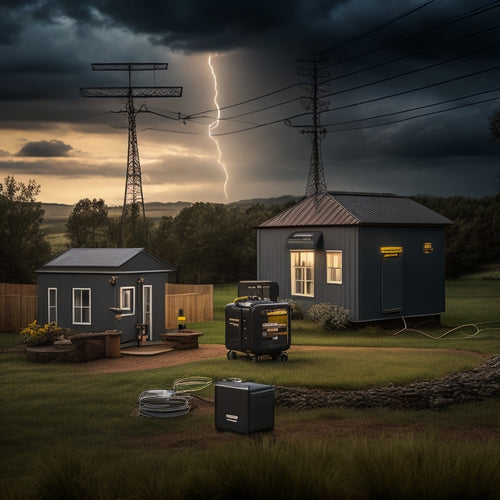
Home Battery Backup
Share
You're considering a home battery backup system to guarantee your family's safety and comfort during power outages. A reliable home battery backup system provides uninterrupted power supply, keeping essential appliances like refrigerators and medical equipment operational. This not only prevents food spoilage and health risks but also enhances energy independence and reduces reliance on the grid. To determine the right system for your needs, you'll need to calculate your energy requirements, assess appliance power consumption, and consider factors like cycle life and battery health protection. As you investigate your options, you'll find the key to unleashing a seamless and sustainable energy experience.
The Essentials
- Home battery backup systems provide electricity during outages, ensuring safety and comfort for families by powering essential appliances.
- Integration with solar energy enhances energy independence, reduces reliance on the grid, and offers long-term cost benefits.
- Regular maintenance and performance monitoring are crucial for reliability and longevity of home battery backup systems.
- Calculating individual power requirements and prioritizing essential appliances during outages ensures uninterrupted power supply.
- Key factors in battery performance include life expectancy, cycle depth, and charging practices, which impact overall system reliability and lifespan.
Reliable Power During Outages
You need a power backup system that provides electricity when you need it most - during outages.
With a home battery backup, you'll have outage protection guaranteed, ensuring your essential appliances stay on. This means you'll have reliable power to keep your refrigerator running, your lights on, and your family safe.
A reliable battery backup for home also prevents food spoilage and maintains safety, and keeps essential devices powered and operational.
Power When You Need
During extended power outages, having a reliable source of energy becomes imperative for homes and families. You need a backup system that can seamlessly take over when the grid fails. A home battery backup system integrated with solar energy provides you with power when you need it most.
This setup guarantees a high level of backup efficiency, allowing you to maintain your home energy independence. By incorporating a Solar Power Backup system, you can say goodbye to the inconvenience of lost productivity, spoiled food, and compromised safety Reliable Electricity Supply.
When considering installation options, it's essential to assess your energy needs and select a system that meets your requirements. Regular maintenance tips, such as monitoring system performance and updating software, are fundamental to guarantee peak operation.
A thorough cost analysis will help you understand the long-term benefits of investing in a home battery backup system. User experiences have shown that these systems can appreciably reduce your reliance on the grid, providing you with the freedom to live life on your own terms.
Additionally, the environmental impact of these systems is appreciably lower compared to traditional fossil fuel-based power sources. By selecting a system with high performance metrics and system compatibility, you'll be able to enjoy uninterrupted power when you need it most.
Outage Protection Guaranteed
Out of the darkness of a power outage, a home battery backup system emerges as a guiding light of reliability, assuring uninterrupted power when you need it most.
With a reliable backup system, you'll never be left in the dark, literally. You'll be able to keep your lights on, your fridge running, and your medical equipment functioning, no matter what's happening outside.
By integrating a battery storage system into your solar setup, you'll reveal the full potential of renewable energy and create a more sustainable, dependable, and cost-effective power solution Grid Scale Battery Storage. This means you can enjoy the freedom to live off-grid, without sacrificing convenience or comfort.
To confirm your system remains reliable, it's vital to follow maintenance tips, such as regularly checking your battery's state of charge, updating your system's software, and performing routine inspections.
Reduces Food Spoilage Risks
You've invested in a refrigerator and freezer to keep your food fresh, but a power outage can render them useless.
With a home battery backup, you're protected from food spoilage during outages, ensuring your groceries remain fresh and safe to eat.
In the event of a grid failure, a residential energy storage system can provide emergency power, keeping your appliances running.
This means you can have peace of mind, knowing your food is preserved and your family's health is protected.
Power Outage Protection
Reliability becomes a top priority when the lights go out, and your refrigerator's contents are at risk of spoiling. You're left wondering how long your food will stay fresh and how you'll keep your family safe. That's why power outage protection is vital for your home battery backup system.
A reliable backup system guarantees your fridge and freezer stay running, keeping your food from spoiling. This means you can focus on more important things, like keeping your family safe and comfortable.
| Consequences of Power Outage | Duration | Impact on Food |
|---|---|---|
| Short-term outage (2-4 hours) | Minimal | Perishable items may start to spoil |
| Medium-term outage (4-8 hours) | Moderate | Most perishable items will spoil |
| Long-term outage (8+ hours) | Severe | All perishable items will spoil |
Achieving energy independence through a home battery backup system is necessary for emergency preparedness. With a reliable system, you'll have peace of mind knowing your food is safe, and you're prepared for any unexpected power outages.
Food Preservation Guarantee
How long can you afford to leave your perishable food items at risk during a power outage?
With a home battery backup, you can rest assured that your food storage remains protected and preserved. This system guarantees that your refrigerator and freezer continue to function, even when the grid fails.
This means that you won't have to worry about spoiled food, wasted money, or the hassle of replacing expired or rotten items.
A home battery backup provides energy efficiency by storing excess energy generated by your solar panels or grid during the day, and using it to power your essential appliances at night or during a power outage.
Deep Cycle Battery Technology
When selecting a deep cycle battery for your home battery backup system, you'll want to take into account two key factors: battery life expectancy and cycle depth.
As you investigate renewable energy solutions for reduced bills and off-grid power backup, it's crucial to understand the role of deep cycle batteries in solar energy storage systems solar energy storage systems.
A battery's life expectancy is measured in the number of charge and discharge cycles it can handle before its capacity degrades.
Understanding how cycle depth affects battery performance will help you choose the right battery for your specific needs.
Battery Life Expectancy
You invest in a home battery backup system to guarantee a stable power supply during outages, and the battery's lifespan is vital to its overall performance. A deep cycle battery's life expectancy depends on various factors, including its quality, usage patterns, and maintenance.
Proper battery maintenance is significant to extend its lifespan. Regular checks on the battery's state of charge, voltage, and temperature can help identify potential issues early on.
You should also be mindful of the charging frequency, as excessive charging can reduce the battery's lifespan. A good rule of thumb is to keep the battery charged between 20% and 80% capacity to minimize wear and tear.
Additionally, avoiding extreme temperatures, physical damage, and deep discharging can also help prolong the battery's life.
Cycle Depth Matters
Deep diving into the world of deep cycle batteries, it's vital to understand the concept of cycle depth, as it greatly impacts the battery's overall performance and lifespan.
When you're relying on your home battery backup to provide power during outages, you want to guarantee it's operating at peak efficiency. Cycle depth refers to the percentage of the battery's capacity that's used during each discharge cycle. A deeper cycle depth means more of the battery's capacity is employed, but it also increases wear and tear on the battery.
To optimize cycle efficiency, you'll want to strike a balance between depth and frequency. Shallow cycles with frequent charging can help prolong the battery's lifespan, while deeper cycles may provide more power but reduce overall lifespan.
Depth optimization is essential, as it directly affects the battery's overall performance and longevity. By understanding cycle depth and its impact on your home battery backup, you can make informed decisions about your energy storage needs and guarantee your system operates at its best.
Calculate Your Energy Needs
You'll need to determine your energy usage patterns to calculate your home's energy needs. This involves identifying the appliances you want to power during an outage and their individual power requirements.
For instance, homeowners who've invested in renewable energy storage solutions, such as solar battery storage solar battery storage, may want to prioritize powering their refrigerators and lights during an outage.
Energy Usage Patterns
During peak hours, your energy usage patterns can greatly impact the performance of your home battery backup system. Understanding your energy consumption and usage trends is essential to optimize the system's efficiency.
By analyzing your energy usage patterns, you can identify opportunities for efficiency improvements, smart usage, and load shifting. This knowledge enables you to adjust your behavioral patterns to reduce energy consumption during peak hours, resulting in cost savings.
Seasonal variations in energy usage also play a notable role in determining your energy needs. By accounting for these variations, you can guarantee your home battery backup system is sized correctly to meet your energy demands.
Renewable integration is another key factor to take into account, as it can considerably reduce your reliance on the grid and lower your energy bills.
Appliance Power Requirements
Appliance Power Requirements (Calculate Your Energy Needs)
Your home's unique appliance profile directly affects the performance and sizing of your home battery backup system. To guarantee seamless backup power, you need to calculate the power consumption of each appliance you want to support during an outage. This involves determining the wattage and voltage requirements of each device, as well as their individual power consumption patterns.
Start by identifying the essential appliances you want to power, such as refrigerators, lights, and medical equipment. Check the nameplate ratings or manufacturer specifications for their power consumption in watts (W). Note the voltage requirements, typically 120V or 240V, to guarantee compatibility with your battery backup system.
Add up the total power consumption of these appliances to determine your minimum required backup capacity. Consider the maximum power surge required to start motors, such as those in refrigerators and air conditioners.
This will help you size your battery backup system accurately, guaranteeing it can handle the power demands of your appliances during an extended outage, giving you the freedom to live life uninterrupted.
Longer Cycle Life Guarantee
When selecting a home battery backup system, you want to make certain it comes with a longer cycle life guarantee, which directly impacts your system's overall performance and lifespan.
A longer cycle life guarantee means the manufacturer has implemented strong battery health protection measures to prevent overcharging, overheating, and deep discharging.
Battery Health Protection
Maximizing your home battery backup system's performance relies heavily on safeguarding its battery health. A well-maintained battery guarantees a longer cycle life, reducing the need for frequent replacements and minimizing waste. You can achieve this by following essential battery maintenance tips.
First, monitor your battery's state of charge (SOC) and depth of discharge (DOD) regularly. This helps you identify potential issues before they become major problems.
Next, adopt ideal charging practices, such as avoiding extreme temperatures, overcharging, and deep discharging. These practices prevent battery degradation, reducing the risk of premature failure.
Additionally, make sure your battery is stored in a cool, dry place, away from direct sunlight and moisture. Regularly inspect your battery for signs of physical damage, corrosion, or wear, and address any issues promptly.
Frequently Asked Questions
Can I Use a Home Battery Backup With My Existing Electrical Panel?
You're wondering if you can upgrade your electrical setup; yes, you can integrate a backup system with your existing panel, but you'll need to verify it meets installation requirements and matches your system capacity to confirm seamless power supply.
Are Home Battery Backups Compatible With Solar Panels?
As you seek freedom from the grid, you wonder if solar panels can harmonize with your battery. Yes, they can! Most battery types, like lithium-ion, seamlessly integrate with solar panels through advanced solar integration systems, allowing you to capture and store renewable energy.
How Long Does It Take to Install a Home Battery Backup System?
When you're planning a system installation, you'll want to know the installation timeline. Typically, the installation process takes around 2-5 days, depending on the complexity of the system and the number of batteries you're installing.
Will a Home Battery Backup Power My Entire House During an Outage?
Can you imagine being completely reliant on the grid during an outage? You'll need a system with sufficient power capacity to cover your energy needs, considering outage duration, to guarantee your entire house stays powered, but it's unlikely you'll be able to power everything.
Are Home Battery Backup Systems Eligible for Government Incentives?
You'll be eligible for government incentives, including tax credits, through incentive programs promoting energy independence and cost savings, when you invest in a home battery backup system, supporting your freedom from grid reliance.
Final Thoughts
With a home battery backup, you're the ruler of your domain, shielded from the uncertainty of grid outages. Food stays fresh, lights stay on, and your digital life hums along uninterrupted. By calculating your energy needs and investing in deep cycle battery technology, you'll reap the benefits of a longer cycle life guarantee. Your home, a fortress of reliability, stands strong against the whims of the grid.
Related Posts
-

Top Eco-Friendly Camping Equipment for a Sustainable Adventure
When you're camping with the planet in mind, opt for eco-friendly gear like tents made from recycled materials and bi...
-

Is Switching to Green Energy Solutions Easy
Switching to green energy solutions isn't just easy; it's also beneficial. You can greatly cut utility costs and enjo...
-

Key Components of a Reliable Emergency Power Supply System
A reliable emergency power supply system requires several key components. You need proven performance metrics to guar...


